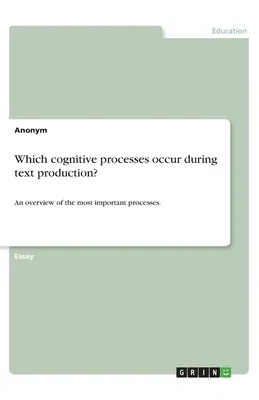Essay from the year 2018 in the subject Didactics - English - Pedagogy,
Literature Studies, grade: 1,7, University of Hildesheim (Institut für
englische Sprache und Literatur), course: M.Ed. Linguistics -
Psycholinguistics, language: English, abstract: The aim of this work is
to clarify what kind of challenges arises for language producers when
expressing complex language units, beyond word- and sentence planning.
Questions like which cognitive processes take place in the planning of
text production? or which aspects play a role when it comes to target
audience or coherence? are trying to be answer in this essay. In this
context, there is no distinction between written or orally produced
texts. First of all, I would like to introduce a common language user
model from a psycholinguistic point of view. Subsequently, the three
basic cognitive processes of speech production: focusing,
selection/linearization and encoding, are going to be analyzed more
closely. Based on this, I will briefly focus on two descriptive models
of cognitive aspects of text production, the description model by
Kintsch and the Story-Grammar model by Rummelhart. Finally, I will
shortly highlight influential model of writing and written text
production in contemporary writing research and their strengths and
shortcomings. These models influence writing research methodologies "and
therefore specific conceptualizations of writing as an object of
inquiry". Hereupon, follows my conclusion, or rather summary, and my
references.


